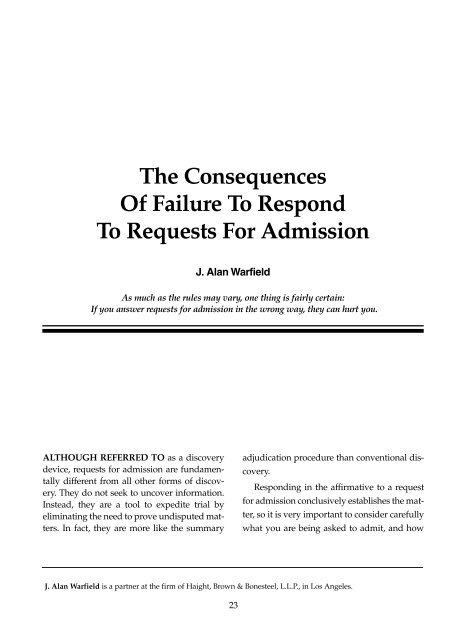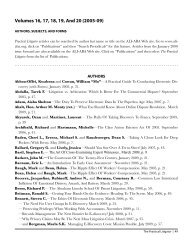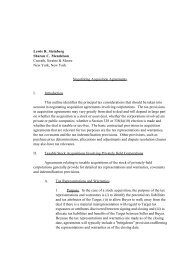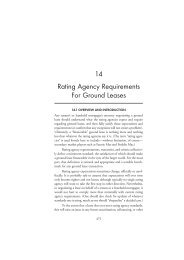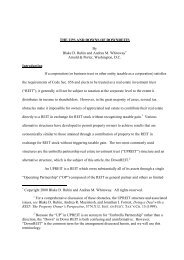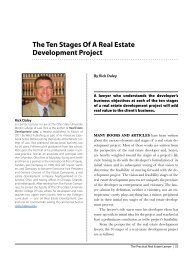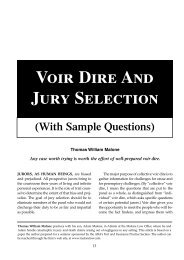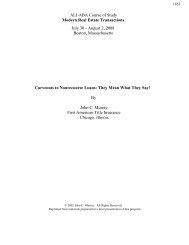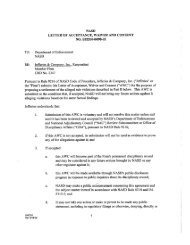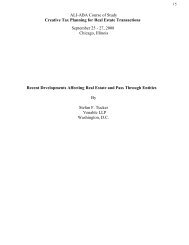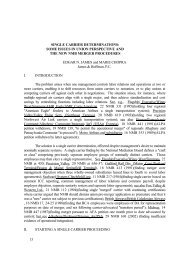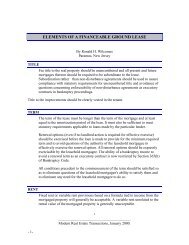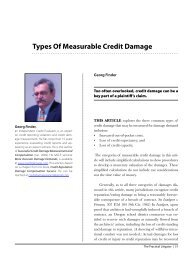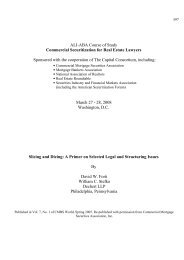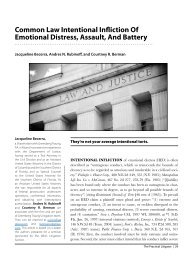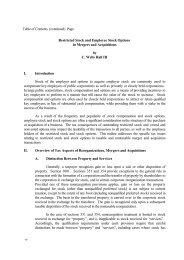The Consequences Of Failure To Respond To Requests For ...
The Consequences Of Failure To Respond To Requests For ...
The Consequences Of Failure To Respond To Requests For ...
You also want an ePaper? Increase the reach of your titles
YUMPU automatically turns print PDFs into web optimized ePapers that Google loves.
<strong>The</strong> <strong>Consequences</strong><br />
<strong>Of</strong> <strong>Failure</strong> <strong>To</strong> <strong>Respond</strong><br />
<strong>To</strong> <strong>Requests</strong> <strong>For</strong> Admission<br />
J. Alan Warfield<br />
As much as the rules may vary, one thing is fairly certain:<br />
If you answer requests for admission in the wrong way, they can hurt you.<br />
ALTHOUGH REFERRED TO as a discovery<br />
device, requests for admission are fundamentally<br />
different from all other forms of discovery.<br />
<strong>The</strong>y do not seek to uncover information.<br />
Instead, they are a tool to expedite trial by<br />
eliminating the need to prove undisputed matters.<br />
In fact, they are more like the summary<br />
adjudication procedure than conventional discovery.<br />
<strong>Respond</strong>ing in the affirmative to a request<br />
for admission conclusively establishes the matter,<br />
so it is very important to consider carefully<br />
what you are being asked to admit, and how<br />
J. Alan Warfield is a partner at the firm of Haight, Brown & Bonesteel, L.L.P., in Los Angeles.<br />
23
24 <strong>The</strong> Practical Litigator May 2006<br />
that admission might be used against your<br />
client. One of the most serious consequences of<br />
failing to respond to requests for admission is<br />
that the requests are “deemed admitted,” and<br />
you will be unable to dispute those matters at<br />
trial. Worse yet, you may never get to trial if<br />
those admissions warrant the entry of summary<br />
judgment in your opponent’s favor.<br />
Responses to requests for admission are<br />
generally “Admit,” “Deny,” or “Unable to admit<br />
or deny.” Depending on the jurisdiction,<br />
additional factual support for responses other<br />
than “Admit” may be required. Alternatively,<br />
you can assert objections. When objections are<br />
asserted, however, the party propounding the<br />
requests for admission can move to compel<br />
further responses. American Federation of State,<br />
County & Municipal Employees v. Metropolitan<br />
Water Dist., 24 Cal. Rptr. 3d 285, 300-01 (Cal. Ct.<br />
App. 2005).<br />
WHAT CONSTITUTES A FAILURE TO RE-<br />
SPOND? • <strong>The</strong> most egregious failure to respond<br />
to requests for admission is the failure<br />
to serve any responsive document at all. <strong>The</strong><br />
legal effect of that omission can be that each of<br />
your opponent’s requests is deemed admitted.<br />
<strong>The</strong>re are other ways you might fail to respond,<br />
however:<br />
• Failing to serve a timely response. California<br />
Code of Civil Procedure section 2033.280;<br />
Wilcox v. Birtwhistle, 987 P.2d 727, 730-31 (Cal.<br />
1999); New York Civil Practice Law and Rules<br />
section 3123(a);<br />
• Failing to provide a client’s verification of<br />
the response. New York Civil Practice Law and<br />
Rules 3123; ELRAC, Inc. v. McDonald, 720<br />
N.Y.S. 2d 912 (N.Y. Sup. Ct., 2001); California<br />
Code of Civil Procedure section 2033.210 and<br />
section 2033.240; Thomas v. Makita, U.S.A., Inc.,<br />
226 Cal. Rptr. 413, 415 (Cal. Ct. App.1986);<br />
• Failing to provide the response in the proper<br />
format is a ground for deemed admissions<br />
only if the response is substantively defective.<br />
<strong>For</strong> example, in New York, it is insufficient to<br />
respond informally in a letter, but only because<br />
such correspondence would lack the required<br />
client verification. New York Civil Practice<br />
Law and Rules section 3123; ELRAC, supra.<br />
Similarly, in California, the statute provides a<br />
detailed description regarding the format for<br />
the response, California Code of Civil Procedure<br />
section 2033.210. However, the response<br />
is actionable only if the deficiency is a failure to<br />
respond fully and accurately to each request.<br />
American Federation, supra, 24 Cal. Rptr. 3d at<br />
300-01;<br />
• Finally, failing to explain the factual basis<br />
for a denial or the reason you cannot admit or<br />
deny a request when that information is required<br />
also constitutes a failure to respond.<br />
New York Civil Practice Law and Rules section<br />
3123(a). You must be judicious in responding<br />
that you are unable to admit or deny a request<br />
based on a lack of information. Although it is<br />
true that one party is not required at his or her<br />
expense to prepare the opponent’s case, the responding<br />
party is required to conduct a reasonable<br />
investigation of the facts to provide an<br />
adequate response. Lindgren v. Superior Court of<br />
Los Angeles County, 47 Cal. Rptr. 298, 301-02<br />
(Cal. Ct. App. 1965).<br />
<strong>The</strong> statute governing requests for admission<br />
should specify the extent to which an explanation<br />
for responses is required. In New<br />
York, the governing statute requires an explanation<br />
for all responses that are not an unqualified<br />
admission, including a statement setting<br />
forth in detail the reasons why the matter<br />
could not be admitted or denied. New York<br />
Civil Practice Law and Rules section 3123(a).<br />
By contrast, in California, only the short answers<br />
and objections are to be included in the<br />
response to requests for admission. California<br />
Code of Civil Procedure section 2033.210(b).<br />
An explanation of any response that was not
<strong>Requests</strong> <strong>For</strong> Admission 25<br />
an unqualified admission is required only if<br />
form interrogatory number 17.1 is propounded<br />
with the requests for admission. This means<br />
that the explanatory statements will appear as<br />
part of the response to form interrogatories<br />
rather than as part of the response to requests<br />
for admission.<br />
This can, but need not, be a trap for the unwary<br />
attorney propounding requests for admission.<br />
<strong>The</strong> practical effect of failing to serve<br />
form interrogatory 17.1 with the requests for<br />
admission is that you delay the time your opponent<br />
has to provide an explanation for why<br />
your requests have not been admitted (which<br />
can be very useful information). In jurisdictions<br />
like California, the time does not begin to<br />
run against your opponent until you properly<br />
serve a request for that information.<br />
THE CONSEQUENCES • <strong>The</strong> trial court has<br />
at its disposal punitive measures of varying<br />
degree, depending on the egregiousness of the<br />
failure to respond. <strong>Of</strong> course, there may be no<br />
consequences at all if the requests for admission<br />
were not properly asserted. <strong>For</strong> example,<br />
at one time in California, no negative consequences<br />
would be enforced unless the requests<br />
contained a proper warning. Thomas,<br />
supra, 226 Cal. Rptr. at 415; Janetsky v. Avis, 222<br />
Cal. Rptr. 342, 345-46 (Cal. Ct. App. 1986);<br />
Hernandez v. Temple, 142 Cal.App. 3d 286, 289<br />
(1983). <strong>The</strong> requesting party had to place “at<br />
the end” (not buried in the middle) a warning<br />
that failure to comply with the provisions of<br />
the request for admission statute would immediately<br />
result in the matters being deemed<br />
admitted. New York does not require a warning,<br />
and the warning requirement has been<br />
dropped from California’s statutory scheme.<br />
Wilcox, supra, 987 P.2d at 731-32. <strong>The</strong> manner<br />
in which requests are deemed admitted in<br />
California has also been modified, as discussed<br />
below.<br />
<strong>The</strong> trial court has at its<br />
disposal punitive measures<br />
of varying degree, depending<br />
on the egregiousness of the<br />
failure to respond.<br />
Assuming the requests for admission were<br />
properly asserted, and the time within which<br />
responses are required to be served has passed<br />
(30 days in California, and 20 days in New<br />
York), one faces both immediate and potential<br />
consequences. In California, for example, failing<br />
to serve a timely response automatically waives<br />
your objections to the requests for admission,<br />
including those based on privilege and work<br />
product. California Code of Civil Procedure section<br />
2033.280.<br />
In New York, however, failure to serve a<br />
timely response means that each of the matters<br />
is immediately and automatically deemed admitted.<br />
New York Civil Practice Law and Rules<br />
section 3123(a). It is true that the court can always<br />
relieve a party from the effect of its failure<br />
to respond, but absent the court’s willingness to<br />
provide that relief, the consequences can be significant.<br />
In California, when a party fails to respond<br />
to requests for admission, the matters are not<br />
automatically deemed admitted. Instead, the<br />
responding party still has an opportunity to<br />
serve responses (without objections) up to the<br />
time of the hearing on a motion for an order<br />
that “matters specified in the requests” are<br />
deemed admitted. California Code of Civil<br />
Procedure section 2033.280(c); Wilcox, supra,<br />
987 P.2d at 730-31. If such a motion is filed,<br />
however, a monetary sanction will be imposed


